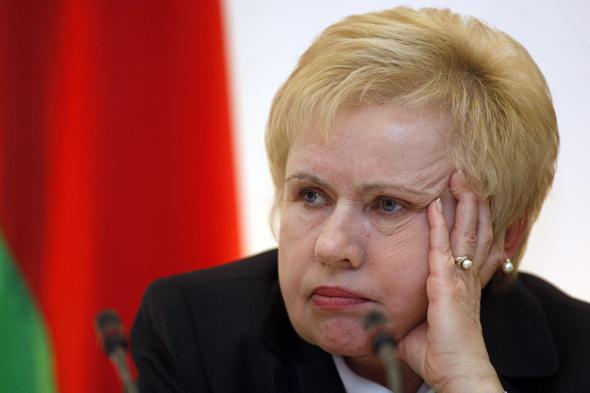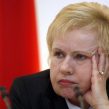
Parliamentary Elections Announced in Belarus
Publication: Eurasia Daily Monitor Volume: 9 Issue: 125
By:

Belarusian president Alyaksandr Lukashenka signed a decree on June 18, which announced that the 2012 elections to the House of Representatives (HR or Parliament) would be held on September 23. Elections for the upper house of the National Assembly, the Council of the Republic (64 members, elected on a geographic basis, mostly through local Soviets), will take place between June 20 and September 20. Concerning the main elections to the larger lower house (henceforth Parliament), all potential candidates must be nominated by August 5; and registration of candidates will take place between August 14 and 23. The official term of the current Parliament ends on October 27 (Telegraf.by, June 20).
The elections are admittedly a ritual and have been criticized and even ridiculed as such by several observers over the past weeks. No truly democratic elections have taken place in Belarus since 1994, and no Western agency has recognized any of the previous parliamentary elections as free and fair (see https://en.rian.ru/world/20101222/161892111.html). In the past, many potentially troublesome candidates have been de-registered or disqualified at the early stages, often on the flimsiest of pretexts. Already the taxation authorities have been running extensive audits on the leader of the United Civic Party, Anatol Lyabedzka for the past seven months, as well as on his wife’s sister and her husband (Charter97.org, June 21).
The power and makeup of the Parliament are very limited. Lukashenka inherited a body of 260 members, and reduced it to a powerless entity of 110 when he amended the Constitution in 1996. No major opposition politician has ever been elected, despite the fact that the popular standing of individual opposition candidates in presidential elections has consistently polled 20-27 percent, and even higher in Minsk (see Oleg Manaev in Belorusy i Rynok, November 19-26, 2001; www.iiseps.org/e3-06.html). Only once since Lukashenka was first elected President has an opposition faction emerged inside the Parliament – the so-called Respublika faction, consisting at its peak of 11 members, and headed by Syarhey Skryabets (see EDM, July 5, 2004). One independent deputy was Olga Abramova, who represented the Belarusian branch of Yabloko and was elected to Parliament for one term in October 2000. But she could hardly be considered a member of the opposition and supported a more conciliatory EU attitude to Belarus (https://www.mfa.gov.by/print/en/press/news_mfa/ae750de7d207a0ac.html).
Those running today, as then, must deal with the formidable chair of the Election Commission, Lidziya Yarmoshyna, one of those figures who remained on the EU travel ban list even during the more harmonious period of 2008-2010. Yarmoshyna has already made several statements about the importance of the elections. Parties and NGOs that take a constructive position may be regarded favorably, and in theory the state might financially support a political party, developed not only at the top, but also with grassroots support in local branches. She stated on June 25 that the current crop of opposition leaders is too old and incapable of leading their parties in the coming elections (Telegraf.by, June 25), a typically subjective intrusion into the political arena. She also commented that some of the most active parties in Belarus are supporting European sanctions, and harming their own country. For the state to support such entities would constitute a form of masochism, she declared, in an interview with the Belarusian Telegraph Agency (Belorusskiy Partizan, June 21).
To date, the regime has never backed a political party to control Parliament, in contrast to the Russian Federation. The public association Belaya Rus, created in 2007 – it reportedly has almost 130,000 members – has not evolved into a presidential political party (https://www.belayarus.by/ru/?guid=10031).
Writing in the presidential newspaper, Vadim Elfinov presented an eloquent monologue on the meaning of elections and what those running for office wished to achieve. Elections are contradictory in their very nature, he wrote, which is why there is never universal satisfaction with the results. He cited Winston Churchill’s dictum that although democracy has many shortcomings, mankind to date has not invented anything better. The goal of elections is not to embrace all points of view; their task is to identify the prevailing mood of society, legislate it and transform it into a political force. Once in office, the deputy has to forget his former stances and take responsibility for the affairs of the state. The coming elections are the responsibility of all the people and their commitment to what is happening in society. “Only in this way can we build an effective civil society,” Elfinov argued (SB-Belarus’s Segodnya, June 21).
These sorts of statements demonstrate the state’s insistence on performing the ritual of elections – perhaps to enhance or maintain a form of legitimacy, or to demonstrate the lack of popularity of opposition parties and movements. That is why some groups, most notably the European Belarus movement, the Young Front and the Belarusian Christian Democratic Party (as yet unregistered), advocate a boycott in the belief that participation is futile and serves only to legitimize the Lukashenka regime. Others, however, have opted at least to campaign. And it seems, despite the evident futility of taking part, there are some logical reasons for doing so. Uladzimer Hlod points out that the idea of a boycott is publicized only in independent newspapers that lack wide circulation, and only 10.6 percent favored it in the most recent IISEPS poll (https://www.svaboda.org/content/article/24535765.html). There are also some logical reasons for participation.
For one thing, because of amendments to the Electoral Code introduced 18 months ago, candidates have the right to set up campaign funds to a maximum of 100 million Belarusian rubles (about $12,100), or 1,000 times the minimum salary. With these funds, candidates can purchase time on TV and radio, or take out advertisements in major newspapers. Candidates are also entitled to some radio and TV time, as well as newspaper coverage, free of charge. It is stipulated only that candidates cannot receive government funds or contributions from abroad (Naviny.by, June 20). As far as parliamentary elections are concerned, the amendment gives candidates unprecedented opportunities to express their views and become better known among the electorate. And although well-known political opposition leaders will no doubt find their path to running barred or hindered, there should be opportunities for others to represent genuine concerns of their constituents.
The periods of elections generally are not only times of heightened political activity, but also of contact with towns, villages, and grassroots society. They are thus an opportunity to be taken not necessarily for the goal of reaching office the benefits of which in this instance may be miniscule but of communicating with voters and making their presence known. Some groups are already taking active steps. Leader of the Belarusian Popular Front, Alyaksey Yanukevich, has announced his candidacy, and the party intends to nominate at least 40 candidates (Telegraf.by June 19). Deputy Chairman of the United Civic Party Lev Margolin has also declared his candidacy, and the participation of Lyabedzka was also reported, though it has yet to be verified. Another potential UCP candidate is the renowned economist and former Chair of the National Bank Stanislau Bahdankevich (Telegraf.by, June 20). Uladzimir Nyaklayeu’s “Tell the Truth” campaign and the former opposition Communists (“A Just World”) will also take part (Gazeta.ru, June 19).
In principle, Vadim Elfinov is correct: elections are an opportunity for building links, determining public concerns, and establishing contacts with the electorate. One can add that this statement applies even under the harshest of conditions and when there are no prospects for victory.




